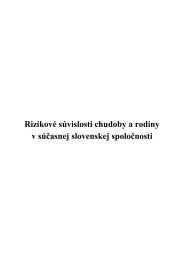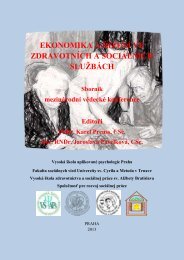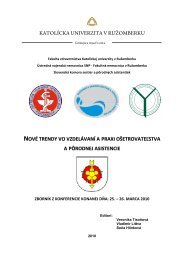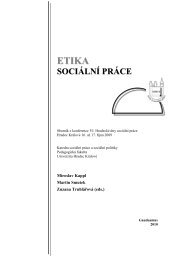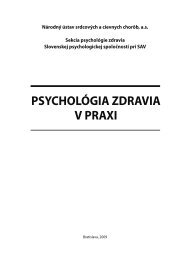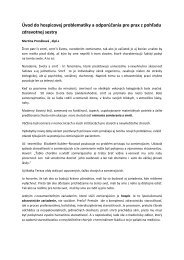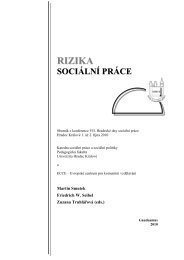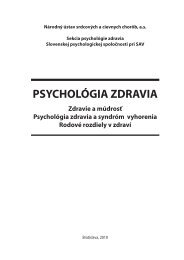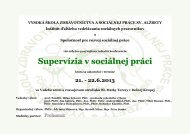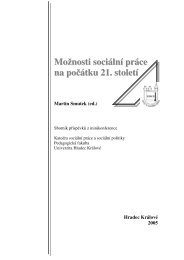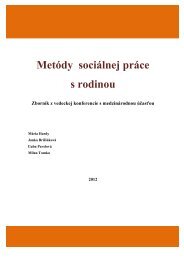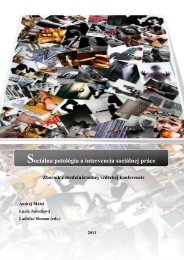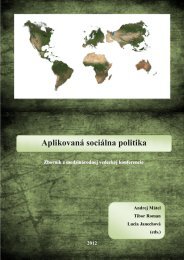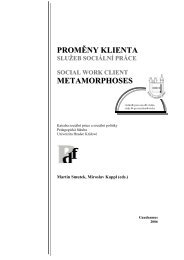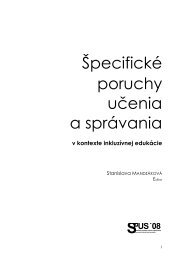Zmena klÃmy â možný dopad (nielen) na obyvateľstvo - Prohuman
Zmena klÃmy â možný dopad (nielen) na obyvateľstvo - Prohuman
Zmena klÃmy â možný dopad (nielen) na obyvateľstvo - Prohuman
Create successful ePaper yourself
Turn your PDF publications into a flip-book with our unique Google optimized e-Paper software.
policy makers have to be able to team-up with experts from other fields to perform<br />
the paradigm shift in addressing the global learning problem.<br />
Due to the complexity and interrelatedness of the modern world we need a new,<br />
integral paradigm that can more successfully support our considerations, action<br />
plans and their implementation. We have to search for a comprehensive theory<br />
(or a new paradigm) that can provide convincing expla<strong>na</strong>tions of, for example,<br />
successful sustai<strong>na</strong>ble practices, and reliable guidance in developing new models<br />
of inclusive green economy (in various contexts, on different levels, in diverse<br />
cultures). Inevitably, this theory has to be transcultural and transdiscipli<strong>na</strong>ry – integrating<br />
knowledge from various social sciences and humanities (like philosophy,<br />
sociology, anthropology, economics…) as well as wisdom and experiences from<br />
different cultural contexts on global level.<br />
This is a very complex task.<br />
New Integral Framework<br />
The approaches to Integral Economics and to Integral Research and Innovation<br />
developed by Ronnie Lessem and Alexander Schieffer (2010 a, 2010 b) could represent<br />
this kind of a new paradigm. According to the Integral Approach, every<br />
social system needs to find, in order to be and stay sustai<strong>na</strong>ble, a dy<strong>na</strong>mic balance<br />
between its four mutually reinforcing and interdependent ‘worlds’ and its ‘centre’.<br />
In other words, a living social system consists of a:<br />
• Centre: the realm of religion and humanity<br />
• South: the realm of <strong>na</strong>ture and community (the mode of doing, associated with<br />
the philosophical approach of humanism)<br />
• East: the realm of culture and spirituality (becoming – holism)<br />
• North: the realm of science and technology (knowing – ratio<strong>na</strong>lism)<br />
• West: the realm of fi<strong>na</strong>nce and enterprise (doing – pragmatism)<br />
The same then applies to a sustai<strong>na</strong>ble approach to economics. An Integral<br />
Economy comprises as well of four ‘worlds’ and a centre, and an overriding economic<br />
theme in each of the four realms can be found:<br />
• The ‘southern’ <strong>na</strong>tural and commu<strong>na</strong>l realm promotes the self-sufficient community-based<br />
economy.<br />
• The ‘eastern’ cultural and spiritual realm promotes a developmental culture-based<br />
economy.<br />
• The ‘northern’ scientific and technological realm promotes a social knowledge<br />
based economy.<br />
134



